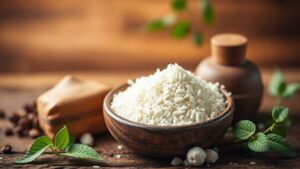Autoimmune diseases occur when the immune system mistakenly attacks healthy cells, causing inflammation, fatigue, and pain. While medical treatment is essential, certain home remedies can help manage symptoms naturally. Anti-inflammatory foods, herbal supplements, and stress-reduction techniques may support immune balance. Gentle movement and hydration also play a role in easing discomfort. Examining these approaches can provide relief, but comprehension of which remedies work best requires a closer look at their benefits and practical applications.
Anti-Inflammatory Foods to Incorporate
Several nutrient-rich foods can help reduce inflammation linked to autoimmune conditions. Omega-3 rich foods, like salmon, walnuts, and flaxseeds, are known to ease inflammation via balancing fatty acids in the body. Probiotic-rich foods, such as yogurt, kefir, and sauerkraut, support gut health, which plays a key role in immune function.
Leafy greens like spinach and kale provide antioxidants that fight oxidative stress, while berries offer anti-inflammatory compounds. Turmeric, with its active ingredient curcumin, could also help lower inflammation when added to meals. Olive oil, nuts, and seeds contain healthy fats that support cellular repair.
Choosing whole, unprocessed foods over sugary or fried options can make a noticeable difference in managing symptoms over time. Small dietary changes frequently lead to gradual improvements in overall health.
Herbal Supplements for Immune Support
While diet plays a central role in managing autoimmune symptoms, certain herbal supplements can also provide immune support through calming inflammation and balancing the body’s defenses. Adaptogenic herbs like ashwagandha and holy basil help the body handle stress, which can otherwise trigger flare-ups.
Turmeric, with its active compound curcumin, reduces inflammation, while ginger soothes digestive issues common in autoimmune conditions. Immune-boosting mushrooms—such as reishi, chaga, and turkey tail—contain compounds that regulate immune responses. Licorice root might ease fatigue and support adrenal function, though it should be used cautiously.
Always consult a healthcare provider before starting new supplements, as some could interact with medications. These natural remedies, whenever used thoughtfully, can complement other lifestyle changes for better autoimmune management.
Stress-Reduction Techniques
Chronic stress can worsen autoimmune symptoms through triggering inflammation and disrupting immune balance. Managing stress is essential for those with autoimmune conditions, as it helps reduce flare-ups and supports overall well-being.
Mindfulness practices, such as deep breathing or meditation, encourage relaxation by calming the mind and body. These techniques lower cortisol levels, easing the strain on the immune system. Relaxation activities like gentle yoga, progressive muscle relaxation, or spending time in nature also help. Even simple habits—listening to soothing music, journaling, or engaging in hobbies—can make a difference. Consistency matters; small daily efforts build resilience over time.
Through prioritizing stress reduction, individuals might experience fewer symptoms and improved quality of life. The key is finding what works and making it a regular part of routine.
Gentle Exercise and Movement
Gentle exercise and movement offer a safe way for people with autoimmune diseases to stay active without overloading their bodies. Low-impact activities like yoga, tai chi, or walking help maintain balance flexibility while reducing joint stiffness. These movements also improve circulation, which can ease inflammation and fatigue.
Swimming or water aerobics are excellent options, as the water supports the body and minimizes strain. Stretching routines can prevent muscle tightness and promote relaxation. Even short, frequent sessions—like five-minute stretches or light pacing—make a difference. It’s crucial to listen to the body and avoid pushing too hard. Overexertion can trigger flare-ups, so moderation is key.
Through incorporating gentle movement daily, individuals can support their overall well-being without worsening symptoms. Consistency, not intensity, matters most.
Hydration and Detoxifying Drinks
Staying hydrated plays an essential role in managing autoimmune symptoms, as dehydration can worsen inflammation and fatigue. Drinking enough water helps flush toxins and supports immune function.
Electrolyte balancing drinks, like coconut water or homemade rehydration solutions, replenish minerals lost due to stress or medication. Herbal teas, such as ginger or chamomile, soothe inflammation while providing hydration.
Gut restorative beverages, like bone broth or fermented drinks (kombucha or kefir), promote a healthy microbiome, which is key for immune regulation. Adding lemon or cucumber to water can heighten detoxification. Avoiding sugary or caffeinated drinks prevents further inflammation.
Small, frequent sips are easier for those with digestive issues. Proper hydration and mindful beverage choices can ease autoimmune flare-ups and improve overall health.
Conclusion
Managing autoimmune conditions involves a comprehensive approach, blending diet, stress relief, and natural remedies. For instance, a 2020 study in *Frontiers in Immunology* found that participants with rheumatoid arthritis who consumed turmeric daily reported reduced joint pain and inflammation. While these home strategies support wellness, they work best alongside medical care, offering gentle yet effective ways to ease symptoms and improve daily life. Consistency and patience are key.





